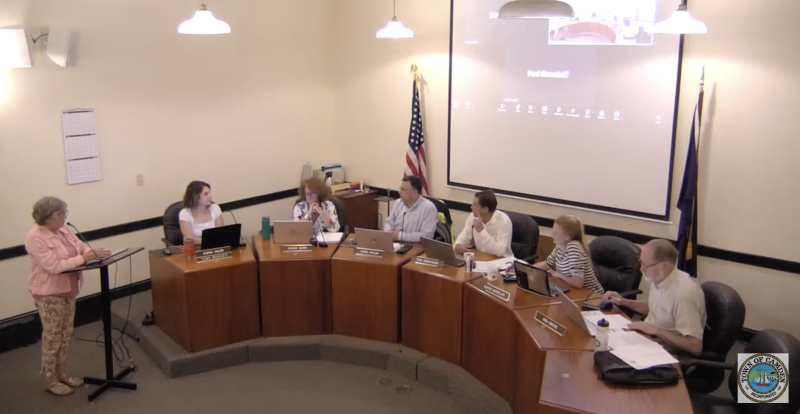Proposed changes to Camden Budget Committee met with skepticism; Select Board agrees to reconsider fireworks rules
CAMDEN — An idea floated Aug. 6 at a regularly scheduled Camden Select Board to change the scope, purpose and name of the municipal Budget Committee was met with skepticism, and though not killed, it was not advanced.
At the same meeting, which ran for several hours, the Select Board agreed to place a warrant article before voters in November asking if Camden wants to allow the ground floor of the former Elm Street School to become multi-family dwelling units. (Read: Plan to convert Camden’s Elm Street School to workforce apartments gathers steam)
To do so, voters will need to approve amendments to the Downtown Business District Zoning District Regulations.
The board also agreed to advance a new herbicide/pesticide provision, as well as an historic preservation action code amendment, both of which are to come before the public for a public hearing Aug. 20.
And, there was a frank conversation about fireworks in Camden, and whether the town should proceed with crafting an ordinance further regulating them.
“I will continue to push for a Fireworks ordinance in Camden,” said Board Chair Tom Hedstrom, Aug. 7, the day after the Select Board meeting. “With Board support, I hope we can get a potential ordinance amendment on the June 2025 ballot.”
Board Chair steps down from position
Hedstrom informed fellow Board members at the outset of the Aug. 6 meeting that he would be resigning as chair.
“I am stepping down to focus more on spending time with my family, which, as you know, spans continents,” he wrote, in a note to the Board. “This decision was made with much consideration, with input from my family, and I did not make it lightly. I genuinely desired to finish my term as Select Board Chair, given the high regard I have for all of you and for the position to which you entrusted to me.”
Hedstrom will remain on the Board, and an election will be held amongst Board members as to who will fill his shoes at their Aug. 20 meeting.
Service Review Committee
While there was receptivity in learning about the proposal of Town Manager Audra Caler to create a Service Review Committee, the reaction was tepid.
Caler outlined the purpose of this new committee, which would replace the existing Budget Committee and change the scope of its mission in the municipal charter.
Currently, the Budget Committee consists of 11 members who are elected at June Town Meeting. They review the proposed annual municipal budget and make recommendations concerning all appropriation articles in the town warrant. It is a lengthy and intense process that begins in February and wraps up when the budget goes before the Select Board for final vote on what expenditures that board wants to place before voters at town meeting.
The revamped committee would review and propose programs and services and or changes to existing programs and services, in the context of their budgetary impacts, said Caler, in a memo that preceded the Aug. 6 meeting. She wrote:
“Camden’s budget process has evolved into an endeavor that typically spans from December to April and consumes many administrative resources and Select Board time and focus during this period. In preparation for the FY25 budget, additional meetings beginning in the fall of 2023 were held with the Budget Committee to provide more in-depth information and background on how departments operated, current programs/projects/initiatives and anticipated changes with a budgetary impact.
“Despite all the background work undertaken by the Budget Committees and Select Boards in the preparation of the past few budgets, the process has concluded with the majority of participants feeling rushed, notably the Select Board feeling there was insufficient time for Select Board discussion and input into the budget process. The time commitment, and financial expertise that is perceived to be required of Budget Committee members, has grown to a point where it is becoming increasingly difficult to find new members who are representative of broad interests and perspectives across the Town.
“Furthermore, the focus on the mechanics of understanding in-depth aspects of municipal budgeting has taken away from the most important and meaningful contributions citizen committees bring to our budgeting process, which is providing feedback on programs and services including their real impact on the community, input on gaps in what the Town currently provides, and advocacy for investing in or shifting the focus of municipal service delivery to align with the policy goals of the community.
“A prominent recent example of this includes budget committees who have advocated for increasing the Town’s investment in climate change resiliency and transitioning to green energy sources, which has resulted in the Town beginning the process of transitioning our fleet of vehicles to hybrid or electric and resources to begin the process of replacing infrastructure to be more resilient to the impacts of climate change.”
She presented, for discussion purposes, the Select Board with proposed changes to the municipal charter concerning the duties of the Budget Committee.
The Service Review Committee would give “us input before we start budget process,” she said, at the meeting. The Service Review Committee would not review proposed appropriations, as the Budget Committee currently does.
“It is unclear to me how this will really differ,” said Board member Susan Dorr. “Will this Service Review Committee be presented with the individual department budgets for their consideration and have the opportunity to review with department heads as w have done in the past? Where will that information come from to make recommendations,” she asked.
Caler responded that the new committee would, “talk about different services they would like to see in the budget, talk about ideas for upcoming years, and vet ideas prior to putting the budget together. By the time we’ve gone through the work of writing the budget, even the Budget Committee doesn’t feel like there is a good place for them in the process; at least it is not very clear.”
Dorr replied: “I’m skeptical that would result in realistic additions or deletions from the budget. People from the general public — we’ve all got wishlists of things we’d like to see happen — I would not want to see the process extended needlessly because we’ve come up with a wishlist and no way to bring it to fruition. I respect the department heads saying, ‘this is what we do and how much we need for doing it.’”
Dorr said that while she appreciated the, “possibility of a more dynamic process,” she was worried, “about putting the cart before the horse.”
Board member Alison McKellar was more supportive of the idea.
“This is potentially one step in the right direction, calling it something different,” she said. “I don’t think we have a strong agreement as to what the purpose of the Budget Committee is.”
Is it a financial oversight committee, or a method of getting citizen input on the budget, she asked.
According to the town charter, the Budget Committee has an established mission.
“Prior to the final review of the proposed budget by the Select Board, the Budget Committee shall meet and adopt recommendations concerning the Town Manager’s proposed budget,” the charter reads. “The recommendations shall be reported to the Select Board prior to its final review of the budget. The Budget Committee’s recommendations shall be included in the Town Warrant for consideration by the voters at the annual Town Meeting.”
McKellar advocated for more citizen involvement, but said: “It is a much broader discussion we have to have. It is not just a Budget Committee. If the goal is to get broad citizen input I don’t think the Budget Committee is accomplishing that because most people don’t want to be on the Budget Committee.”
Board member Ken Gross did not favor the proposed changes. He did, however, agree with the idea of starting the budget process with a purpose and earlier in the season, calling it a “great goal.”
He said the Budget Committee historically considers, “every idea is a good idea and they approve them all.”
To modify that, he suggested the Budget Committee start with a goal, such as assessing the proposed expenditures with a benchmark of not exceeding a three percent budgetary increase.
“It gives them something to measure against,” said Gross. “The Budget Committee is the traditional watchdog on this body [Select Board]. I would hate to see that institution go away.”
Its traditional purpose, he said, “is core to what town government is.”
He warned however, to respect the work of the committee.
“For any volunteer, if their work has not achieved anything then you lose your committee,” said Gross.
Board member Chris Nolan agreed with Gross’ sentiments, adding that, “losing the Budget Committee would feel like losing a degree of governance in the community that anyone could feel they could be part of.”
Starting earlier, however, would make the process longer, he said.
“I don’t think we should be replacing peoples’ opportunities to express directly with department heads on line items budgets,” said Nolan. “Sometimes we have to do it, even if it is not fun. You want to make sure people still have voice in governance.”
He noted the 16 percent increase in expenditures in the current budget, as approved last June, and said: “We don’t want that to happen again. We’ve got to give people the opportunity to understand the impacts of that.”
Skipping the Budget Committee step, “is not a good thing,” said Nolan.
Board Chair Hedstrom said he favored the transition of the Budget Committee to a Service Review Committee.
There would be, “improvement if we limit more of the budget process to the Select Board,” he said.
About the budget and its approval process, he said: “We are inevitably the most informed of citizenry that doesn’t work for the town”... “because of the nature of this service we do.”
A service review committee could, he said, “provide broader idea of what we want for municipal services.”
McKellar pointed out that the municipal budget is the town’s most important document.
“It is our master plan,” she said. “Everything a town does is reflected in a budget.”
With no further comment and no motions made, the discussion ended, with a last thought from Hedstrom: “Good discussion. We will will see about that moving forward.”
Fireworks
During a discussion earlier in the meeting, when Camden’s Communications Coordinator and former Interim Director of Camden Parks and Recreation Department Holly Anderson outlined for the Board a preview of the annual Labor Day weekend Windjammer Festival, the Board collectively objected to the idea of fireworks over Camden Harbor.
“I am opposed to fireworks,” said Board Chair Hedstrom. “I don’t understand why we are doing town-sponsored fireworks.”
He said he was surprised: “to be honest, disappointed that they happened on the Fourth of July. It never came before the board that they were going to have Fourth of July fireworks. I was under the impression that we weren’t going to have them. I only found out about it because I read it in the newspaper. The impact of fireworks is significant. This is a significant amount of debris in our harbor, toxic residue, fire hazards that could be related to the fireworks. I’m told we have to have bucket patrol on Curtis Island.”
Two years ago, the Select Board had informally discussed the value of fireworks over Camden Harbor, and the topic surfaced again for an impromptu conversation Aug. 6.
Hedstrom said the fireworks affect the well-being of wildlife.
“We should be more sensitive to the birds and the fish,” he said. “I would love to see the town come up with alternatives to fireworks for the Fourth of July. And for the Windjammer Festival. I think fireworks are a remnant of the 20th Century and we need to think and move past that, and be a leader in this regard.”
McKellar said: “I would agree with that. The fireworks ends up, no matter who puts them, taking a significant amount of staff time that does not get accounted for. It is a scramble that happens every year.”
Anderson explained that the fireworks during Labor Day weekend would be set off a barge between Curtis Island and Dillingham Point, Aug. 30, at 9 p.m. Central Maine Pyrotechnics will again be the state licensed fireworks show overseer and operations manager.
McKellar said the fireworks set off over the harbor necessitate relocating boats from moorings in the vicinity of the barge to avoid damage.
“We should have conversations about this, for a vote and for the public to say whether they want things or not,” said McKellar. “In reality, it takes a bunch of taxpayer resources to make it happen.”
Town Manager Caler suggested the Select Board decide early in the year its position on hosting fireworks so that businesses will know well in advance, before they sell tickets around an anticipated fireworks event.
“It has gotten kind of muddled as to whatever you would like us to do, and accommodate,” she said.
The July Fourth fireworks show was funded by the Camden Area Business Group. For the Windjammer Festival, fireworks funding has been donated by sponsors, with checks paid to the Town of Camden.
“It would be good to get public feedback,” said Nolan.
He said fireworks were distressing not just for pets, but for veterans who have been in combat.
“It is an expensive 15 minutes,” he said.
Select Board member Dorr said the conversation underway Aug. 6 presented, “an opportunity for us as a community to demonstrate leadership and look at the environmental impact and the impact on taxpayer.”
“I like the idea of setting an example,” she said. “It [a fireworks show] is fun, but is it forward thinking,” she asked.
McKellar said pollution from fireworks resulted in debris that both floats and sinks.
“It is more measurably significant than I realized,” she said.
Hedstrom asked about strengthening municipal ordinance.
Caler referenced the existing Camden fireworks ordinance,which regulates the sale and use of commercial fireworks.
Caler said the fireworks displays take, “a lot municipal resources,” including public safety.
Town Planner Jeremy Martin told the Select Board that the ordinance could be amended to prohibit consumer and commercial use, but would require voter approval to be codified.
“We all love the Windjammer Festival,” said Hedstrom, “Maybe present it as an environmentally sensitive event, and possibly get more donors.”
Martin said a laser show at the Clinton fairground was currently a revenue generator, and suggested that as an option.
Pesticide/herbicide ordinance amendment
At the Aug. 20 Select Board meeting a public hearing will be held to consider amending the town ordinance to include mandatory notifications about chemical applications in town.
The process includes apprising the the Maine Board of Pesticide Control with Camden regulatory developments concerning chemicals.
The proposed code, “would apply to the outdoor application of any pesticide (as defined) by any licensed applicator,” wrote Camden Planner Jeremy Martin, in a memo to the Select Board. “Written notice would need to be provided to abutters and the town two days prior to the application. Written notice would need to include the trade name and EPA registration number of the pesticide being used, the pest that is being treated and a location map of where the application is taking place on someone’s property.
“Placards/signage would need to be installed at least 30 minutes prior to application and placed at least 50 feet apart along property lines and the right of way whether private or public. There is also an annual reporting requirement for licensed applicators to submit annual reports to the town detailing the target sites, targeted pests, pesticide brand name, EPA registration number, total undiluted formulation (in pounds or gallons), and total area treated as listed and as amended on the Commercial Applicator Annual Summary Report required by the Board of Pesticide Control.”
At the Aug. 6 meeting, the Select Board agreed to hold the Aug. 20 amendment public hearing, which would then allow the town to place the matter before voters on the November 5 municipal warrant.
The move to strengthen pesticide/herbicide regulations in Camden grew out of the illegal herbicide application on Metcalf Road, which resulted in poisoned trees, dead vegetation, leaching herbicide onto the adjacent publicly owned Laite Beach on Camden Harbor, a $1.5 million private settlement between private landowners, a $210,000 municipal fine levied against Metcalf Road property owners Amelia and Arthur Bond, and global media exposure.
Martin told the Select Board that the mandatory records of what is being applied where would provide a better idea of what is being used on property in town, in general.
But Board member Gross asked about regulating homeowner applications, as well.
“This puts the burden on the licensed applicators but does not address the homeowners,” said Board member Gross. “It puts such a burden on licensed applicators [that] I could see more homeowners taking it upon themselves [to apply pesticides]. There must be a class of pesticides not available to homeowners. Is that the only protection the town has from people going around and doing their own pesticide work?”
Chair Hedstrom said: “One of the things we are are trying to accomplish here is an initial step. Maybe it is a final step, but this is a move in the right direction that I think a lot of people can get behind. It is also an educational move.”
It raises awareness of herbicides and pesticides that end up in the water, and drinking supplies, he said.
Camden resident Beedy Parker, who was attending the Aug. 6 meeting, said: “I want to thank you for what you are doing. It is wonderful that you are even talking about applicators’ work, versus the homeowners, which is another step. The fact that you are working on this is heartwarming to me.”
She commended the Select Board for taking responsibility for a number of issues, including fireworks.
Resident Will Addis reinforced Parker’s sentiments, and requested a full ban on pesticides, while suggesting safer alternatives.
Camden Public Works Director Dave St. Laurent cautioned that the proposed amendment encompasses more activities than strictly landscape and yard work. He mentioned rodent control, and boat maintenance.
“This reaches a lot of different places,” he said, but added, “I think it is a step in the right direction.”
Historic Preservation Ordinance
The Select Board heard a presentation from citizens, including members on the Historic Resources Committee, advocating for an Historic Preservation Ordinance.
Such an ordinance would help protect historic buildings from destruction and insensitive rehabilitation.
First, however, a nonbonding warrant is being proposed by the Historic Resources Committee, which would allow the continued development of an ordinance that would ultimately appear on the June or November 2025 ballot.
In a memo to the Select Board the Committee wrote:
“Once the HPO is approved on the ballot, the steps that follow are broadly:
- The conversion of the HRC from a committee to a commission.
- The drafting of a Historic Preservation Design Guide which provides information on how to apply the HPO to construction, deconstruction, and renovation.
- Application to the State of Maine to become a Certified Local Government (joining towns like York, Kennebunk, Castine, Biddeford, and Portland) which gives greater access to grants and other state dollars for the Town of Camden.
- And the potential creation of a Deconstruction and ReUse Program whereby sustainable materials are collected from a deconstruction site (demolition or renovation) and recycled for reuse at a construction site.”
The draft warrant article reads:
“Are you in favor of the Town proceeding with drafting a Historic Preservation Ordinance and accompanying definitions and informational material for voter approval on a 2025 ballot?”
Explanation: This question will approve the Historic Resources Committee’s continued development of a Historic Preservation Ordinance that draws on the best practices of comparable towns and the recommendations of the Maine Historic Preservation Commission in an unburdensome measure that will ensure a long-lasting community and unique town character for the businesses and citizens of Camden.”
The Select Board Aug. 6 agreed to consider the final draft of the nonbinding article Aug. 20.
Citizen petition on climate action
Cynthia Stancioff, of Camden, presented a citizen petition to place an article on November warrant supporting Camden joining other towns in Maine that call on Congressional delegates to take strong climate action to enact a policy that reduces carbon pollution and stimulate clean energy economy with a carbon dividend mechanism.
The article reads:

The warrant article will be placed on the Nov. 5 ballot, per municipal charter.
MPERS Public Safety Plan 3C retirement option
At the Aug. 6 Select Board meeting, the Board — after an initial discussion marked by confusion for lack of supporting documentation about the proposal — agreed that a proposal to change retirement plans for first responders in Camden be placed before voters on the Nov. 5 warrant.
The matter will come before the Board again on Aug. 20.
“One more to get on the November ballot,” said Hedstrom.
Reach Editorial Director Lynda Clancy at lyndaclancy@penbaypilot.com; 207-706-6657


































